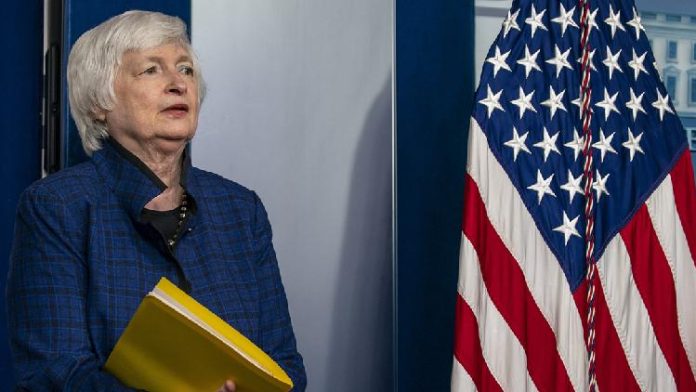On Friday, US Treasury Secretary Janet Yellen stated that the country will likely reach the $31.4 trillion statutory debt limit on January 19, necessitating extraordinary cash management measures to prevent default until early June.
In a letter to the new Republican House of Representatives Speaker Kevin McCarthy and other congressional leaders, Yellen stated, “Once the limit is reached, Treasury will need to start taking certain extraordinary measures to prevent the United States from defaulting on its obligations.” Yellen’s statement was sent.
In order to “protect the full faith and credit” of the United States, she urged legislators to act quickly to raise the debt ceiling.
also read: US Forces Steal 53 Tankers of Oil from Syria to Iraqi Bases
The letter continued, “While Treasury is not currently able to provide an estimate of how long extraordinary measures will enable us to continue to pay the government’s obligations,” stating that “it is unlikely that cash and extraordinary measures will be exhausted before early June.”
Republicans have threatened to use the debt ceiling as leverage to demand spending cuts from Democrats and the Biden administration now that they control the House. This has sparked concerns in Washington and Wall Street regarding the possibility of a bruising conflict over the debt ceiling this year that could be at least as disruptive as the prolonged conflict in 2011, which resulted in a brief downgrade of the US credit rating and years of forced spending cuts on domestic and military programs.
Friday, following Yellen’s letter, the White House stated that it would not negotiate a debt ceiling increase.
Karine Jean-Pierre, a spokesperson for the White House, stated to reporters, “This should be done without conditions.” There will be no discussion about it.
A person familiar with the plan told Reuters that House Republicans intend to move a “debt prioritization” measure by the end of March that would require the US Treasury to continue making certain payments once it reaches the debt ceiling. However, the plan’s specifics have not been finalized. The Washington Post was the first to report on the proposal.
According to sources cited by the Post, the Republican plan will require the Treasury Department to continue making debt interest payments. According to the newspaper, it may also stipulate that the Treasury should continue to fund the military and pay into Social Security, Medicare, and veterans’ benefits.
According to the Post, the strategy was a component of a private agreement that was reached this month to end the conflict that erupted between McCarthy and right-wing hardliners in the House regarding his selection as speaker.
The estimate by Yellen, in which she expressed confidence that the government could pay its bills until early June without raising the limit, marks a deadline that is significantly earlier than forecasts made by some outside budget analysts that the government would run out of cash and borrowing capacity sometime in the third quarter of the calendar year 2023. This date is known as the “X Date.”
Analysts have noticed that some Treasury bills with maturities in the second half of the year have yields that are higher, which may be related to the increased risk of defaulting during that time period.
Shai Akabas, director of economics at the Bipartisan Policy Center, said, “You could read this partly as trying to get Congress to act sooner rather than later.” He also said that Treasury was being conservative in its approach.
Due to a variety of factors, including the difficulties of forecasting the government’s payments and revenues months in advance, Yellen stated that there was “considerable uncertainty” regarding the amount of time that extraordinary measures could prevent default.
Pension investments suspended
US federal debt was $78 billion below the limit as of Wednesday, according to Treasury data, and the Treasury’s operating cash balance was $346.4 billion. On Thursday, the department revealed a deficit of $85 billion for the month of December as spending increased, particularly for debt interest costs.
In her letter, Yellen stated that the Treasury anticipates suspending new investments in two government retiree funds for healthcare and pensions this month as well as reinvestments in the Government Securities Investment Fund, or G Fund, which is part of a savings plan for federal employees. When the debt ceiling is raised, investments in retirement are restored.
Yellen wrote to McCarthy and other congressional leaders, “The use of extraordinary measures enables the government to meet its obligations for only a limited amount of time.”
Consequently, Congress must act quickly to either raise or lower the debt ceiling. “The US economy, the livelihoods of all Americans, and global financial stability would suffer irreparably if the government failed to meet its obligations,” Yellen wrote.
source: nytimes













